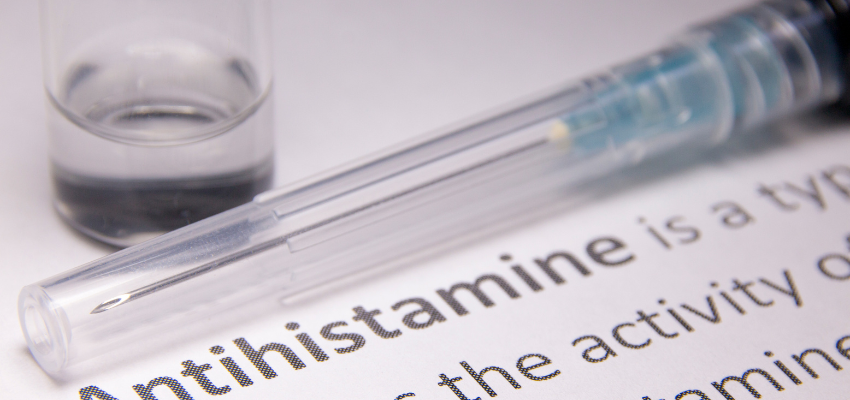Decongestant vs. Antihistamine: Which is More Effective?

Published November 14, 2022
Before you buy over-the-counter (OTC) medications from a pharmacy, it’s usually advisable to first diagnose yourself. That way, you know what kind of drug you need to treat your symptoms. If you diagnose yourself with the flu, for example, the appropriate medication would be antiviral drugs.
While it’s typically a simple process, it can be confusing if your symptoms mostly come from your allergic reaction. After all, two medications – antihistamines and decongestants – can treat allergic reactions.
As such, it makes sense that one would struggle to decide which of the two is more effective for their symptoms. If that’s an issue you’ve been dealing with recently, this article should be plenty of help.
Read on as this guide goes over several things you need to know about decongestant vs. antihistamine, their definitions, differences, and other questions. Let’s start with a brief description of decongestants.
What Is A Decongestant?
Decongestants are a type of medication that provides short-term relief to symptoms that relate to nasal congestion. These include a blocked, stuffy, or runny nose. The medicine isn’t specifically for allergic reactions, but since congestion is a common symptom of allergies, decongestants work perfectly.
What Is An Antihistamine?
Antihistamine is a type of medicine that’s specifically designed to treat allergy symptoms.
These include watery eyes, sneezing, nausea, and above all, congestion. Yes, it can treat the same symptoms as decongestants. That’s precisely why people often have to choose between the two.
However, while they do have similar effects, they also have several differences.
Decongestant Vs. Antihistamine: Differences
There are two main differences between antihistamines and decongestants:
- the way they work, and
- their side effects.
A decongestant relieves congestion by reducing the swelling of the blood vessels inside the nose. By doing so, the airways become more open, allowing air to pass freely and mucus to drain more quickly.
Meanwhile, antihistamines work by regulating the production and release of histamines, hence the name.
For your reference, histamines are organic compounds that the body releases whenever it detects something harmful. These compounds cause the skin to swell and blood vessels to expand.
That ultimately leads to clogged airways or congestion. Antihistamines prevent that from happening by inhibiting histamine production. Put simply, each of the two medications treats congestion differently.

Another difference between the two, as stated earlier, is their side effects. Antihistamines can cause:
- difficulty peeing, and
- blurry vision.
Decongestant, on the other hand, can lead to:
- a rash,
- irritation of the nose lining, and
- restlessness or agitation.
Keep in mind that these are not their only side effects. Others include sleepiness, drowsiness, headaches, the sensation of sickness, and a dry mouth. However, these are common between the two.
Decongestant Vs. Antihistamine: Which Should You Take?
It ultimately depends on your condition. There are times when a decongestant would be more helpful than an antihistamine and vice versa. Let’s take a closer look at those particular ‘times’ or scenarios.
Decongestants are better if…
- the congestion was due to the common cold, flu, or anything aside from an allergy, or
- you have epilepsy, since antihistamines can cause drug-induced seizures.
Antihistamines are better if…
- the congestion was due to an allergy, or
- you have diabetes, high blood pressure, hyperthyroidism, or glaucoma.
Can I Take Antihistamine And Decongestant Together?
Yes, you can take antihistamines and decongestants together. In fact, it’s a common practice to take both medications in combination with one another. It’s safe, and it should increase their effectiveness.
However, remember that these two medications don’t work in combination with just any medication.
Antihistamines, for example, may cause harmful effects if you take them alongside indigestion medicines.
Interestingly enough, both antihistamines and decongestants can cause harmful effects when you take them with antidepressants. It has to do with how antidepressants tend to increase blood pressure.
Of course, there are other medications or supplements that can work perfectly in combination with these two medications. Probiotics, for example, can work with just about any over-the-counter medication.
Benefit From The Latest Advancements In Probiotic Science With Bionaze
Bionaze is a proprietary blend of probiotics proven to promote ear, nose, and throat health, improve digestion, and support your immune system. The active ingredients BLIS K12, and BL-04 are considered among the best probiotics according to science.
Get 25% Off Your First Order when you use BIO25 at checkout!

This Content Has Been Reviewed For Factual Accuracy
This content has undergone thorough fact-checking by our team of internal experts. Learn more about the meticulous editorial standard for our website here.
ADVERTISEMENT

About The Author
Lenard Arceo is an experienced writer who enjoys learning to code in his spare time. He has a fascination with health and nutrition and enjoys sharing his knowledge and research. He is proud of his commitment to communicating factual content that has helped his readers with life changing choices over the years.




